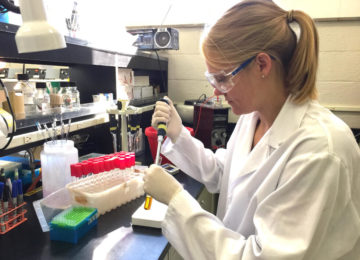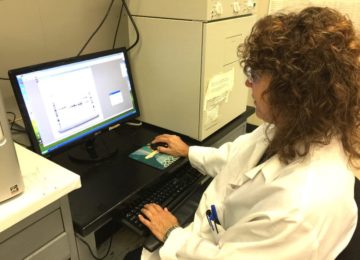

APPROACHES
BTR microbiologists and molecular biologists have worked with a large spectrum of microorganisms. We have successfully applied two general approaches to strain development:
- Classic mutagenesis, screening and selection.
- Advanced recombinant methodologies.
CLASSICAL MUTAGENESIS STRAIN DEVELOPMENT
Classical strain development programs typically focus on increasing the yield of an enzyme, an antibiotic or other products through mutagenesis and screening. Agar-based specific screening methods are often successfully used to identify improved mutants generated by mutagenesis using ultraviolet irradiation or chemical mutagens. Improved strains are confirmed in a shake flask screen, and then subjected to further rounds of mutagenesis.
The outcome of classical strain development can be maximized by coupling with fermentation process development.
ADVANCED RECOMBINANT STRAIN DEVELOPMENT
Bio-Technical Resources molecular biologists are highly skilled in applying advanced recombinant methodologies to strain development. Saccharomyces cerevisiae strains were developed through metabolic engineering for production of farnesol and geranylgeraniol.
Further details:
A world-class technology was developed for commercial production of glucosamine and N-Acetylglucosamine through E. coli metabolic engineering coupled with fermentation process development
Further details:
Among many advanced techniques in our tool box, Adaptive Evolution (pdf) is a proven strategy for strain improvement by which microbes are grown for large numbers of generations under conditions specifically designed to select for special traits.
Depending on the particular cases, Adaptive Evolution could start with a wild type strain or natural isolate, or targeted genetic engineering is required to allow the manifestation of a particular trait. Classic mutagenesis could also be employed to speed up the process and or enlarge the window of opportunity for success.
Directed Evolution involves introduction of random mutations to a gene of interest through mutagenic process (such as error-prone PCR), and screening of variants that display novel or improved characteristics.
CRISPR-Cas technology has become, in the recent years, an extremely powerful method for genome editing and gene regulation control.
Bio-Technical Resources offers non-proprietary multiple microbial host platforms for recombinant protein expression.
For additional details please see our Protein Expression Services
Bio-Technical Resources offers non-proprietary multiple microbial host platforms for recombinant protein expression.
STRAIN DEVELOPMENT SUCCESS STORIES
Three examples of metabolic engineering for microbial strain development are showcased in PowerPoint presentations. More examples are highlighted in PowerPoint slideshow Strain development examples.
